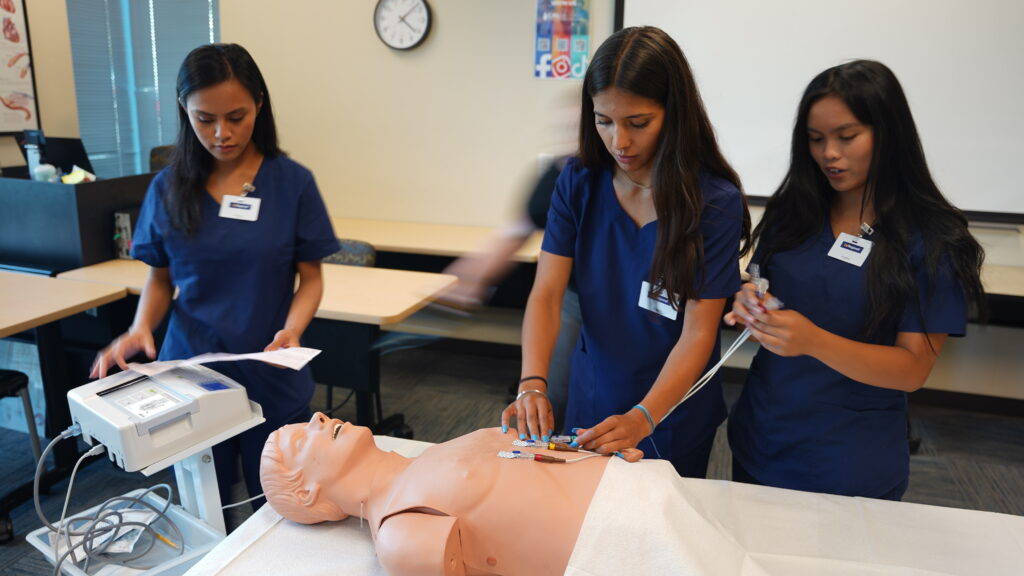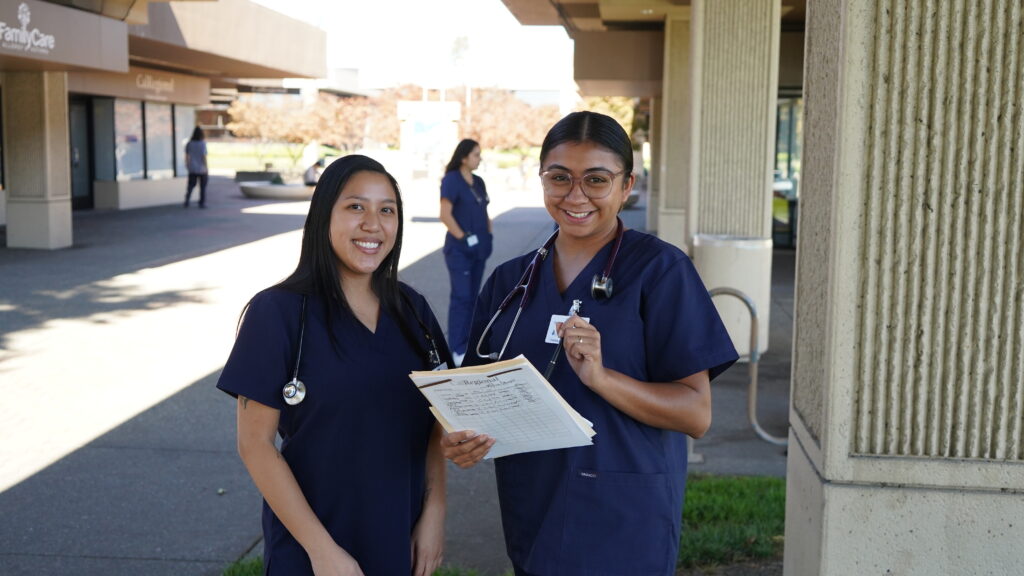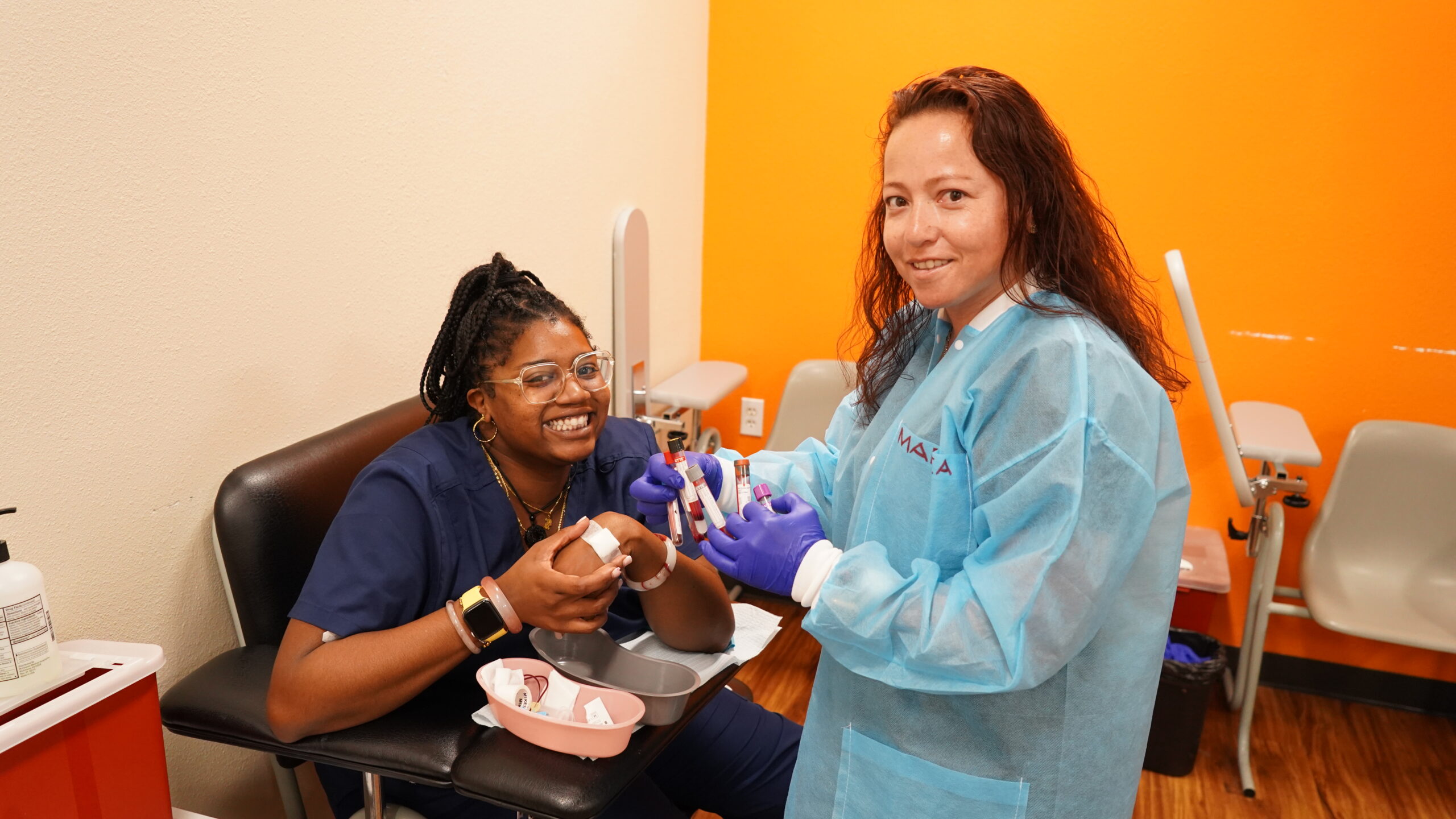Table of Contents
Congratulations on graduating from phlebotomy school and passing the national certification exam! Over the past weeks, you spent invaluable hours mastering the art of drawing blood and learning medical standards and practices. Hopefully, you’ve also gotten comfortable in scrubs. Many phlebotomy school graduates lead fulfilling careers as certified phlebotomy technicians. The national median annual salary for phlebotomists is $43,130.
However, for many phlebotomy school graduates, this is only the first step on your professional path in the healthcare field. From becoming an EKG technician to a physician’s assistant, learning to draw blood properly can be the foundation for numerous career opportunities. In this blog post, we’ll explore five popular career paths phlebotomy school graduates pursue after receiving their phlebotomy certification.
1. Medical Assistant
Medical assistants play a versatile role by supporting the administrative and clinical sides of healthcare facilities such as hospitals, clinics, and private practices. Often a patient’s first point of contact, medical assistants may be responsible for administrative tasks like scheduling appointments, managing patient information, and verifying insurance. Their clinical duties include preparing examination rooms, taking patient vital signs, administering medication, and performing basic lab tests. Medical assistants can adapt to different roles and ensure that operations run smoothly.
Why Phlebotomy School Graduates Make Great Medical Assistants
One of the clinical skills required of a medical assistant is venipuncture, the process of drawing blood for laboratory testing, transfusions, or research. This skill is essential in many healthcare settings because blood tests are a common diagnostic tool. Completing a phlebotomy technician program is a great first step for individuals interested in becoming medical assistants.
Phlebotomy school provides foundational knowledge of medical terminology, patient interaction, and infection control practices, all of which are critical for medical assistants. Phlebotomy training can make a candidate more competitive and skilled in a medical assistant role, especially in work environments where blood draws are frequent.
Medical Assistant Requirements and Salary
Most employers require or prefer their staff to complete a medical assistant certification program. CALRegional’s Medical Assistant Program is $2,995 or less and can be completed in 8-10 weeks. Bonus: Returning CALRegional students receive $500 off their next program. The national median annual salary for medical assistants is $43,350.
Want To Learn More?
2. EKG Technician
An EKG (Electrocardiogram) technician is a healthcare professional who performs tests that measure the electrical activity of the heart. They operate and monitor EKG equipment during tests and surgical procedures. These tests are crucial for diagnosing cardiovascular issues such as heart attacks, arrhythmias, and other cardiovascular conditions.
EKG technicians are responsible for administering tests, recording results, and maintaining equipment. They also work closely with patients during an EKG by explaining how tests work and offering emotional support to nervous patients.
Why Phlebotomy School Graduates Make Great EKG Technicians
While drawing blood is not part of an EKG technician’s role, phlebotomy school graduates can still naturally transition into this role because of the medical knowledge and patient interaction skills gained during their training.
One big incentive to advance your career in healthcare, including EKG certification, is the bump in salary you’ll most likely experience. Comparatively speaking, EKG technicians tend to make more than phlebotomists, though this can vary with years of experience.
CALRegional’s Phlebotomy Technician Program teaches students how to work in fast-paced healthcare environments, interact empathetically with patients, and understand basic medical terminology. All of which are skills essential in the EKG field.
Additionally, having experience in drawing blood can enhance an EKG technician’s ability to provide comprehensive patient care, particularly in facilities where dual certifications are valued.

EKG Technician Requirements and Salary
Most employers require or prefer their staff to complete an EKG certification program. CALRegional’s EKG Technician Program is $1,995 or less and can be completed in 3.5 weeks online. Individuals interested in the program should have basic knowledge of the role of an EKG technician (e.g. medical terminology related to electrocardiography, preparing a patient for a 12-lead EKG/ECG, EKG strip analysis, and basic EKG interpretation.) Bonus: Returning CALRegional students receive $500 off their next program. The national median annual salary for EKG technicians is $70,270.
3. Clinical Lab Technician
If you’ve enjoyed working with specimens in a lab, becoming a clinical lab technician (CLT) could be the career for you. A clinical lab tech, also known as a medical laboratory tech, analyzes bodily fluids, including blood, urine, and tissue samples, to help diagnose and treat diseases. They play a key role in hospitals, research facilities, and even academic or pharmaceutical companies.
CLTs conduct tests to measure chemical components, identify pathogens, or assess cell count. In addition to routine testing, some CLTs specialize in areas such as microbiology, biotechnology, and toxicology. In addition to the medical field, CLTs play an important role in industrial labs by ensuring the quality of food, cosmetics, and other industrial products.
Why Phlebotomy School Graduates Make Great Clinical Lab Technicians
The role of a CLT demands precision, attention to detail, and safety protocol compliance. As a phlebotomist, you already have experience handling blood samples, which will help you transition into this role. Phlebotomy school prepares you for the precision involved in specimen collection and management and grants you access to a clinical environment.
Adhering to safety protocols, interacting in a laboratory environment, and handling laboratory equipment are fundamental skill sets for future CLTs. All of these skills can be honed during your phlebotomy classes.
Also, receiving your phlebotomy certification can get your foot in the door with many clinical lab science programs. The prior experience showcases an understanding and commitment to a technical and detail-oriented career.
Clinical Lab Technician Requirements and Salary
To become a CLT, individuals typically need an associate degree in clinical laboratory science, medical laboratory technology, or a related field. Phlebotomy certification is not always mandatory, but it is highly recommended and often required by employers to demonstrate competence. The national median annual salary for clinical lab technicians is $62,870
Want To Learn More?
4. Registered Nurse
Becoming a registered nurse (RN) is one of the most common career paths for phlebotomists. Registered nurses have a much wider set of responsibilities and work in various settings. They work with doctors to administer treatment, monitor patients, and educate families about medical conditions.
An RN’s daily routine is full. Nurses make daily rounds to check on their patients, update medical records, and administer medication. Additionally, RNs provide direct patient care by dressing wounds, aiding in personal hygiene, and helping with emergencies.
Why Phlebotomy School Graduates Make Great Registered Nurses
Programs such as CALRegional’s Phlebotomy Technician Program can serve as a solid foundation for aspiring RNs. The technical phlebotomy skills learned during our labs, such as proper needle handling, vein selection, and tourniquet application, are essential for anyone interested in becoming a nurse.
While venipuncture is an important skill set for any RN, phlebotomy school teaches something far greater: how to interact with patients. As a registered nurse, you will work closely with patients and their families who need physical and emotional support. Nurses must understand how to establish trust, reduce stress, and communicate with their patients.
In phlebotomy training, students learn to handle real-world patients experiencing different emotions. It’s common for people to feel nervous or have trouble cooperating during medical procedures. Phlebotomists understand how to ease their patients before a blood draw quickly. This skill is paramount for a registered nurse in a high-stress environment, such as an emergency room.
Registered Nurse Requirements and Salary
To become a Registered Nurse, individuals must complete a nursing program. This typically includes a two-year associate degree (ADN), or four-year bachelor’s degree (BSN) in nursing, as well as passing the NCLEX-RN exam for licensure. The national median annual salary for registered nurses is $94,480.

5. Physician’s Assistant
A physician’s assistant is a licensed healthcare professional who works under the direct supervision of a physician. PAs are trained to perform many of the same duties as doctors, such as diagnosing illnesses, creating treatment plans, and writing prescriptions. Physician’s assistants can specialize in family medicine, emergency care, pediatrics, or surgery, but are found in almost every area of healthcare.
Why Phlebotomy School Graduates Make Great Physician’s Assistants
A phlebotomy tech’s background in patient care, diagnostic testing, and familiarity with a clinical setting is extremely helpful when working toward becoming a PA. The interpersonal and technical skills learned in phlebotomy school will also be needed when caring for patients as a physician’s assistant.
Similar to the previous career paths, venipuncture may not play a significant role in a PA’s daily routine, but phlebotomy school provides critical experience in addressing patient concerns and maintaining professional composure in a medical environment.
Physician Assistant Requirements and Salary
Becoming a PA requires a significant amount of education, including a Bachelor’s and a Master’s degree. Thus, some prefer to get their foot into the door quicker and to work faster with a phlebotomy certification first.
Additionally, you must pass the Physician Assistant National Certifying Examination (PANCE) to become certified. On average, most PAs graduate in 6-7 years, but the rewards are immense. The national median annual salary for physician’s assistants is $130,490. Transitioning to the role of PA is a highly challenging but rewarding career path for a phlebotomy tech ready to take a deep dive into the medical world.
Reaching the Next Step in Your Career with Phlebotomy School
Going to phlebotomy school is an excellent first step in a healthcare career. You gain invaluable experience working with patients, which can prepare you for a wide range of career paths. Whether you choose to become a medical assistant, EKG technician, nurse, medical lab technician, or physician’s assistant, your experience during phlebotomy school will help you succeed in your chosen profession. And if you decide to remain a phlebotomist for years to come, that’s amazing too!
CALRegional can help you get dual certification as a medical assistant or EKG technician, and our returning students get $500 off their next program! Want to learn more about returning student discounts or programs?


